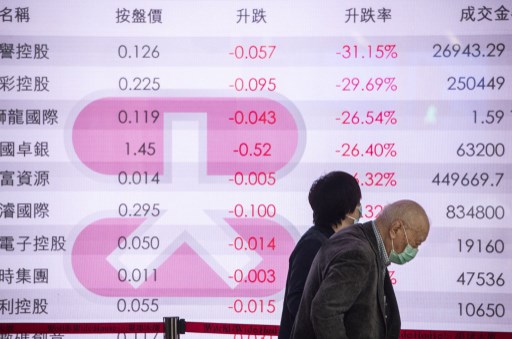Asian markets suffered again on Tuesday over fears that Russia is about to invade Ukraine, but early signs that tensions could be easing – with Moscow pulling some troops back from the border – boosted European stocks and sent oil prices down.
Equities have been in turmoil after US national security adviser Jake Sullivan warned last week that Russia could storm into Ukraine “any day now,” having amassed more than 100,000 troops on its border in recent weeks.
Western powers have drawn up a series of tough sanctions against Moscow in the event of an invasion but there is a big worry that such a move would have serious economic consequences since the two countries are key sources of vital commodities including oil, gas and wheat.
The price of each of them has soared in recent weeks. However, there was a glimmer of hope that recent diplomatic efforts could pay off, with Russian foreign minister Sergei Lavrov saying there was “always a chance” for agreement with the West and reports of some troops being withdrawn from the border on Tuesday.
German Chancellor Olaf Scholz was due in Moscow on Tuesday for talks with Putin.
Also on AF: China Gives Green Light to Audi-FAW’s $3.3bn EV Venture
“The geopolitical risks still remain elevated as Russian troops remain at the Ukrainian border, but the risk of military conflict happening this week appears to have eased,” OANDA’s Edward Moya said.
The response from Lavrov improved the mood on markets slightly, helping Wall Street off its intra-day lows, though all three main indexes ended in negative territory for a second day.
London, Paris and Frankfurt all rose in early trade. Earlier, Tokyo retreated as investors brushed off data showing Japan’s economy rebounded in the final three months of 2021, while there were also losses in Hong Kong, Sydney, Singapore, Seoul, Wellington, Taipei and Manila, but Shanghai, Mumbai, Bangkok and Jakarta edged up.
The benchmark Nikkei 225 index ended down 0.79%, or 214.40 points, at 26,865.19, while the broader Topix index lost 0.83%, or 15.95 points, to close at 1,914.70.
The Hang Seng Index lost 0.82%, or 200.86 points, to 24,355.71. But the Shanghai Composite Index rose 0.50%, or 17.21 points, to 3,446.09, while the Shenzhen Composite Index on China’s second exchange climbed 1.35%, or 30.50 points, to 2,283.63.
Oil prices fell around 2% at one point before paring the losses, though they remain at more than seven-year highs and within touching distance of $100 a barrel.
Fed’s Inflation Battle Plan
The long-running saga over the Fed’s plans for fighting inflation – which is at a 40-year high – were also still on traders’ minds, with the central bank expected to hike rates next month but speculation is rife over how much it will move and how many more times.
St Louis Fed President James Bullard said on Monday that officials needed to be decisive in their actions, telling CNBC “our credibility is on the line here.”
But some commentators warned that with prices being fuelled by factors such as surging energy costs and supply chain problems, the Fed hikes could have little effect.
Still, with the global economy in recovery mode and most governments easing containment measures, observers remain upbeat about the outlook for markets.
“Times will certainly become somewhat rougher on the markets, as the first weeks of this year have already shown,” DWS chief investment officer Stefan Kreuzkamp said. “However, on a 12-month horizon, we stay with our positive assessment of equities.”
Key figures around 0830 GMT
Tokyo > Nikkei 225: DOWN 0.8% at 26,865.19 (close)
Hong Kong > Hang Seng Index: DOWN 0.8% at 24,355.71 (close)
Shanghai > Composite: UP 0.5% at 3,446.09 (close)
London > FTSE 100: UP 0.5% at 7,568.96
New York > Dow: DOWN 0.5% at 34,566.17 (Monday close)
- AF with additional editing by Sean O’Meara
Read more:
China Developers’ Bonds Extend Slide on Repayment Concerns
Oil Prices Could Hit $125 On Supply Snarls, Warns JP Morgan
























